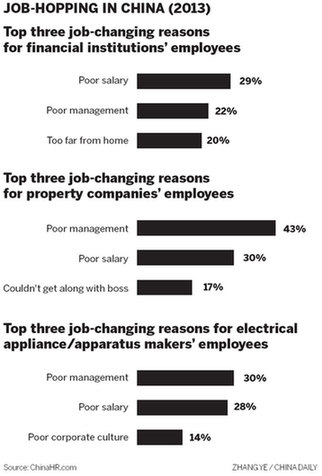Job-hopping sneaks in early
Updated: 2013-02-18 09:46
By Wang Wen (China Daily)
|
|||||||||||
Many companies reduced pay rises this year because of fears about the economy, the main reason chosen by 26 percent of job-hoppers looking to move on, according to ChinaHR's report.
The recruitment agency interviewed a selection of businesses. Only 0.8 percent of them said they will increase their employees' salaries by 20 percent or more in 2013. The percentage was 2.7 percent in 2012.
The number of companies awarding pay rises between 11 and 20 percent also fell from 16.7 percent in 2012 to a predicted 11.2 percent in 2013, according to the agency's report.
|
 |
Meanwhile, the continuous rise of the consumer price index, which measures inflation, caused employees' living costs to increase, leading to high expectations over salary rises to relieve financial pressures.
"If their expectations are not achieved, they will have to find new jobs," said Liu Xiangyang.
ChinaHR.com also discovered financial, real estate and electric appliance manufacturing industries have more job-hoppers compared with other industries so far this year.
Employees in the financial industry are more sensitive to rising incomes and they feel the need for a higher quality of life, Liu said.
Some have chosen to weather the economic ill winds, while some have decided to leave.
Wang Li, a 27-year-old woman who has worked for an accounting firm in Beijing for three years, said she was asked to take five days of unpaid leave by the end of 2012. She used to be too busy to take year-end leave in the years before 2012.
Wang said she had less work to do recently and was not sure about her year-end bonus, although she received a 20-percent salary rise last October.
However, she said she and her colleagues would try to keep their jobs.
"It is not a good time to be quitting the job because the whole industry faces economic problems and there are few job opportunities in the market at the moment," she said.
Wang has good reasons for believing that.
American Express Co, the US multinational financial services corporation headquartered in New York, plans to eliminate 5,400 staff jobs in order to cut costs and adjust its business, the company said on Jan 10.
Goldman Sachs Group Inc, the US investment banking firm, said in July last year it would cut 1,000 staff worldwide.
"Keeping one's current job is a wise decision just now," said Huang Yi, a 23-year-old woman who has worked for one of the so-called "Big Four" accountancy firms since July last year.
If the employees really want to change jobs, the automotive and retail industries would be good choices, experts said.
"The automotive market and retail industries will both be very active," said Max Price, a partner at Antal China, a United Kingdom recruitment and headhunting company.
He said there is lots of organic growth forecast within the sectors.
Companies in these industries want experienced people rather than fresh graduates, which will lure some job-hoppers.
But Price nonetheless suggested people should be cautious about changing jobs and should stay three to five years with a company before moving on to a new role.
"Job-hopping every two or three years is terrible for career development in the long term," he said.
Contact the writer at wangwen@chinadaily.com.cn
Related readings
China creates 12.66m new jobs in 2012
Hudson Report: Job outlook mixed
China investment supports jobs in America
China aims to ensure 'equal pay for same job'
Today's Top News
Police continue manhunt for 2nd bombing suspect
H7N9 flu transmission studied
8% growth predicted for Q2
Nuke reactor gets foreign contract
First couple on Time's list of most influential
'Green' awareness levels drop in Beijing
Palace Museum spruces up
Trading channels 'need to broaden'
Hot Topics
Lunar probe , China growth forecasts, Emission rules get tougher, China seen through 'colored lens', International board,
Editor's Picks

|

|

|

|

|

|





